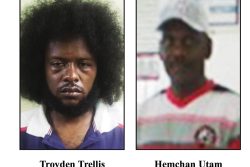(Trinidad Guardian) Acting Commissioner of Police Stephen Williams has confirmed that 50 murders were recorded last month, making September the most violent month for 2015.
He attributed the spike to the number of guns, including high-powered rifles, being brought into the country illegally through the country’s porous borders. However, he said, over the last ten days there had been a drop in the violence, with a total of seven murders being recorded.
Williams said statistics showed that of the over 300 murders the country has recorded to date, 82 per cent had been committed with firearms.
Firearms entering this country illegally were having a significant impact on the country, Williams said during an interview on i95.5FM yesterday.
“Eighty-two per cent of all the murders committed in 2015 have been committed with firearms. So firearms are making a major impact on the violence in T&T.
“So we have murders and then we have shootings and woundings. So firearms are again being involved. So within the realm of crime, firearms are contributing significantly and that is negatively impacting this country and we have to find a way to fix the problem we are confronted with.”
Speaking about proper border patrol, Williams said if the Government could stop the flow of illegal firearms into the country the police could guarantee taking them off the streets.
For the year, he said, police had taken 477 guns off the street and 6,400 rounds of ammunition. In 2014, Williams said, they took a total of 585 illegal guns off the streets.
In relation to the poor crime detection rate, Williams said the police had changed its approach, introducing hot spot policing in 256 areas within the nine police divisions, targetting concentrated areas within a 100-to-200 metre radius. He said this had resulted in the TTPS recording its biggest drop in crime.
“When we introduced that in 2013 we saw crime drop by 26.3 per cent, which really means that the numbers moved from 17,841 down to 13,147. That has been the biggest drop ever in the history of the police service in any one year.”
The closest they came to that, he said, was during the state of emergency (SoE) in 2011 when they recorded a 21.1 per cent drop.
“What we saw after the SoE is that crime went back up. With the SoE we got a 21.1 per cent drop, with hot spot policing we got 26.3, which is higher than the SoE, without locking down people. What we are seeking to do is to see this as a sustainable strategy,” Williams said.








